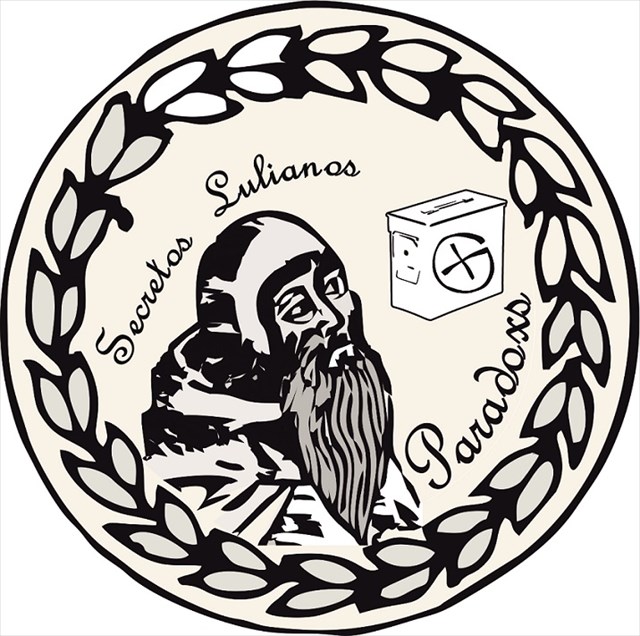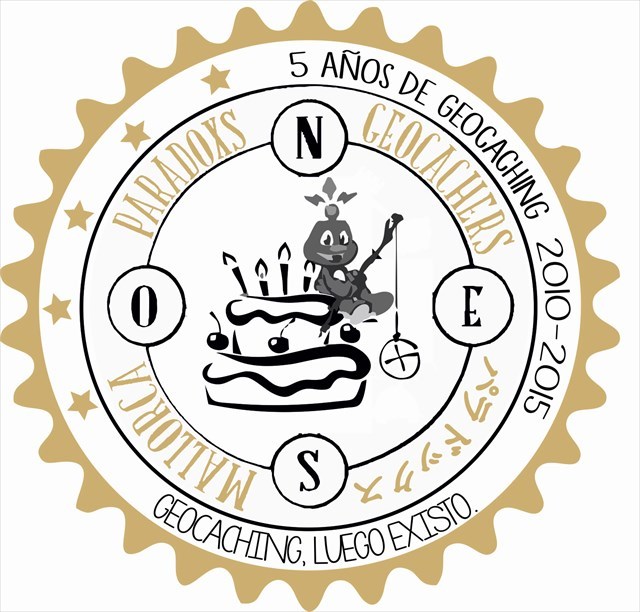Sa Cova des Beat
El Árbol de la Ciencia
La Máquina
El Razonamiento
Ascenso y Descenso del Entendimiento
El Fin de los Secretos
Los Secretos Lulianos es una serie de cachés que te adentrará en una aventura llena de curiosidades, misterios y secretos con la que queremos conseguir dos objetivos:
El primero es hacer memoria sobre el personaje de Ramón Llull, su vida, su obra y su pensamiento.
Además de ser considerado una figura muy importante en el uso de las lenguas, especialmente el de la lengua catalana escrita, también destaca la cantidad de campos en los que realizó aportaciones, destacando la Teología y la Filosofía. En cuanto a su obra y pensamientos, tomamos parte de ellos para representación de los Secretos, simplemente como reseñas y en algunos casos como solución si son interpretados desde los prismas adecuados.
El segundo objetivo es conducir esta aventura a las entrañas del bosque donde Ramón Llull encontró su hogar, en el monasterio de Miramar, entre el 1279 y el 1295. Para ello os conduciremos por algunos rincones significativos y otros tan nimios que son capaces de ocultar los más grandes misterios.
Esta serie es un desafío. Necesitarás varias horas para completarla, asi que no olvides traer suficiente agua y un calzado adecuado. Necesitarás mucha paciencia y tal vez un poco de ingenio. Y necesitarás traer tu propio boli/lápiz.
NO USES LA FUERZA PARA ABRIR LAS CAJAS. Y POR FAVOR DEJA TODO COMO ESTABA. SI NO ABRES LA CAJA Y ESCRIBES EN EL LOGBOOK, NO PUEDES REGISTRAR EL CACHÉ COMO FOUND. ¡NO DEJEIS OBJETOS NI RASTREABLES DENTRO DE LA CAJA!
El Razonamiento

Los estudiosos cristianos del siglo XIII celebraron el hallazgo de Llull, a pesar de que pronto detectaron los problemas del razonamiento luliano. Si bien es cierto que normalmente ambas ciencias están de acuerdo —porque lo que es cierto en filosofía no puede ser falso para el teólogo— ambas llegan a la verdad por caminos diversos: la teología se apoya en la razón y la revelación divina, mientras que el filósofo está solo frente al problema, provisto únicamente de su propia razón.
Los árabes fueron un paso más allá: criticaban a la Ars Magna expresando que, según ellos, lo que es falso en filosofía «perfectamente puede ser verdadero en teología», porque nada es imposible para Dios y Él muy bien puede pasar por encima de las limitaciones de la ciencia. Este concepto se conoce como «Verdad de Doble Nivel».
En su afán de refutar a los musulmanes, Llull exageró el concepto en el sentido opuesto: opinó que la doble verdad era imposible puesto que la teología y la filosofía eran en verdad la misma cosa. Equiparaba de este modo e identificaba a la fe con la razón. El descreído no era capaz de razonar, y el hombre de fe aplicaba una razón perfecta. De este modo creyó haber resuelto, gracias a las pruebas de significados lógicos y por supuesto a su mecanismo, una de las más grandes controversias de la historia del conocimiento.
El problema de estos postulados era que arrasaban con la diferencia entre las verdades naturales y sobrenaturales. Como Llull era esencialmente un filósofo místico, para él la razón no puede vérselas con las verdades más altas; para ello, es preciso en toda circunstancia echar mano de la fe. De esta manera, afirmaba que la fe iluminaba a la razón, por ejemplo, para desentrañar el misterio de la Santísima Trinidad: hay un solo Dios verdadero representado en tres personas, que a pesar de todo no son ni pueden ser «tres dioses». Creyó, mediante mecanismos similares, poder llegar a probar el motivo de todos los misterios y las razones de todos los artículos de fe.
Si la razón exige a la fe que la auxilie, también la segunda necesita de la primera, porque la fe por sí misma podía conducir a error. Llull creía que el hombre dotado de fe pero no de raciocinio era como un ciego: puede encontrar ciertas cosas al tacto, pero no todas ni todas las veces.



Beatified Man’s Cave
The Tree of Science
The Machine
The Reasoning
Rise and Fall of Understanding
The End of the Secrets
Lullian Secrets is a series of caches that offers you an adventure full of curiosities, mysteries and secrets, with which we want to achieve two objectives:
The first is to remember the character of Ramón Llull: his life, his work and his thought.
Besides being considered a very important figure in the use of languages - especially in written Catalan - he also stands out for the number of fields in which he made contributions, particularly in theology and philosophy. As for his work and thoughts, we take part of them to represent the Secrets, sometimes just as reviews, and in some cases as a solution if they are interpreted from the right point of view.
The second objective is to lead this adventure into the depths of the forest where Ramón Llull found his home - in the Miramar monastery - between 1279 and 1295. To do this, you'll walk through some significant corners and some other so trivial that they are able to hide the greatest mysteries.
This series is a challenge. You will need several hours to complete it, so do not forget to bring enough water and suitable shoes. You will need a lot of pacience and some wit. And you will need to bring your own pen.
DON'T USE FORCE TO OPEN THE BOXES. AND PLEASE LEAVE EVERYTHING AS YOU FOUND IT FOR THE NEXT GEOCACHER. IF YOU DON'T OPEN THE BOX AND WRITE IN THE LOGSHEET, YOU CAN NOT LOG THE CACHE AS FOUND. NO TRADE OBJECTS NOR TB'S IN THE BOX PLEASE!!
The Reasoning

Christian scholars of the thirteenth century celebrated the findings of Llull, although soon they detected the problems of the Lullian reasoning. While normally both sciences agree —because what is true in philosophy can not be false for the theologian— both arrive at the truth through different paths: theology leans on reason and divine revelation, while the philosopher is alone against the problem, equipped only with their own reason.
The Arabs went one step further: they criticized the Ars Magna saying that, according to them, what is false in philosophy "perfectly can be true in theology", because nothing is impossible to God and He really may well override the limitations of science. This concept is known as "Two-tier Truth".
In his eagerness to refute the Muslims, Llull exaggerated the concept in the opposite direction: he thought that the double truth was impossible since theology and philosophy were really the same thing. Thus he equated and identified faith with reason. The unbeliever was not able to reason, and the man of faith applied a perfect reason. Thus he thought he had solved, thanks to the tests of logical meanings and of course his mechanism, one of the biggest controversies in the history of knowledge.
The problem of these postulates was that they dealt with the difference between natural and supernatural truths. As Llull was essentially a mystical philosopher, to him reason couldn't deal with the highest truths; for them, it was necessary in all circumstances to draw on faith. Thus, he claimed that faith illuminated the reason, for example, to unravel the mystery of the Holy Trinity: there is only one true God represented in three persons, which are not and cannot be "three gods". He believed, by similar mechanisms, to be able to reach the source of all mysteries and the reasons for all the articles of faith.
If reason requires faith to help it, also the second requires the first, because faith in itself could lead to error. Llull believed that a man endowed with faith but no reason was like a blind man who can find certain things to touch, but not all things and not all the time.



Beatified Man’s Cave
The Tree of Science
The Machine
Die Argumentation
Aufstieg und Fall des Verständnisses
Das Ende der Geheimnisse
Lulianos Geheimnisse ist eine Cacheserie, die dir ein Abenteuer voller Merkwürdigkeiten, Mysterien und Geheimnissen bietet, bei denen es um zwei Dinge geht:
Erinnerung an die Person Ramón Llull: sein Leben, seine Arbeit und seine Gedanken.
Abgesehen davon, dass er eine wichtige Rolle beim Gebrauch von Sprachen - inbesondere beim geschriebenen Katalan- gespielt hat, fällt sein Name ebenso in weiteren Bereichen, zu denen er Beiträge geliefert hat (besonders in Religion und Philosophie). Durch seine Arbeit und Gedanken nehmen wir teil an den Geheimnissen, manchmal nur im Überblick, in einigen Fällen als Lösung, wenn sie vom richtigen Standpunkt aus betrachtet werden.
Das zweite Ziel ist es, das Abenteuer in die Tiefe des Waldes zu leiten, wo Ramón Llull zwischen 1279 und 1295 ein zu Hause gefunden hat: im Miramar Kloster. Dafür musst du einige bedeutende Stellen aufsuchen, sowie andere, die wiederum so nichtssagend aussehen, dass sie in der Lage sind, die größten Geheimnisse zu bewahren.
Diese Serie ist eine Herausforderung! Du wirst mehrere Stunden benötigen, vergess daher nicht genügend Wasser und geeignete Schuhe mitzunehmen! Du wirst eine Menge Geduld und Köpfchen benötigen. außerdem brauchst du noch einen Stift.
VERWENDE KEINE GEWALT BEIM ÖFFNEN DER DOSEN! UND HINTERLASSE BITTE ALLES, SO WIE DU ES VORGEFUNDEN HAST, DEM NÄCHSTEN CACHER. WENN DU DIE DOSE NICHT ÖFFNEN UND DICH NICHT INS LOGBUCH EINTRAGEN KANNST, DANN DARFST DU DIESEN CACHE AUCH NICHT ALS FOUND LOGGEN.
Die Argumentation

Christiliche Schulen im 13. Jahrhundert feierten die Erkenntnisse Llulls, obwohl sie schnell die Probleme in Llulls Argumentatio entdeckten. Während normalerweise beide Wissenschaften übereinstimmen (weil was richtig in Philosophie ist, kann in Theologie nicht falsch sein), erreichen beide die Wahrheit auf unterschiedlichen Wegen: Theologie beruft sich auf Vernunft und göttlicher Offenbarung, während der Philosoph das Problem nur mit der eigenen Vernunft allein angeht.
Die Araber gingen noch einen Schritt weiter: sie kritisierten die "Ars Magna", denn nach ihrer Meinung kann das was falsch in der Philosophie ist durchaus absolut whar in der Theologie sein, weil für Gott nichts unmöglich ist und er die Grenzen der Wissenschaft überschreiten könnte. Dieses Konzept ist bekannt als "Wahrheit auf zwei Ebenen" (Anmerkung: dies ist die wörtliche Übersetzung aus dem Spanischen).
In seinem Bestreben die Muslime zuückzuweisen hat Llull sein Konzept in eine andere Richtung auf die Spitze getrieben: er dachte, dass die Doppelwahrheit unmöglich ist, solange Theologie und Philosophie wirklch das gleiche seien. Deshalb identifizierte er Glauben mit Vernunft und setzte sie gleich. Der Ungläubige war nicht zur Vernunft fähig, der Gläubige dagegen schon. So glaubte Llull (Dank Logik und deren Mechanismen) die größte Ungereimtheit in der Geschichte der Erkenntinis gelöst zu haben.
Das Problem an diesen Aussagen war, dass sie mit dem Unterschied zwischen natürlichen und übernatürlichen Wahrheiten handelten. Weil Llull ein mystischer Philosoph war, konnte für ihn Vernunft allein nicht zur höchsten Wahrheit führen, es war auf jeden Fall notwendig auf den Glauben zurück zu greifen. So behauptete er, dass Glauben die Vernunft beleuchtet, z.B. um der Entwirrung des Geheimnisses um die Heilige Dreifaltigkeit: es gibt nur einen wahren Gott repräsentiert von drei Gestalten, welche nicht "drei Götter" sind oder sein werden, Er glaubte ebenso die Quelle für alle Mysterien und die Gründe für alle Glaubensangelegenheiten erreichen zu können.
Wenn die Vernunft Glauben benötigt, um zu helfen, dass braucht der Glaube ebenso die Vernunft, weil Glaube allein zu Fehlern führen kann. Llull glaubte, dass ein Mensch, der nur mit Glaube aber nicht mit Vernunft ausgestattet ist, wie ein Blinder ist, der zwar bestimmte Dinge berühren kann, aber nicht alle Dinge zu jeder Zeit.
Thanks a lot to Broiler for her translation! :D



